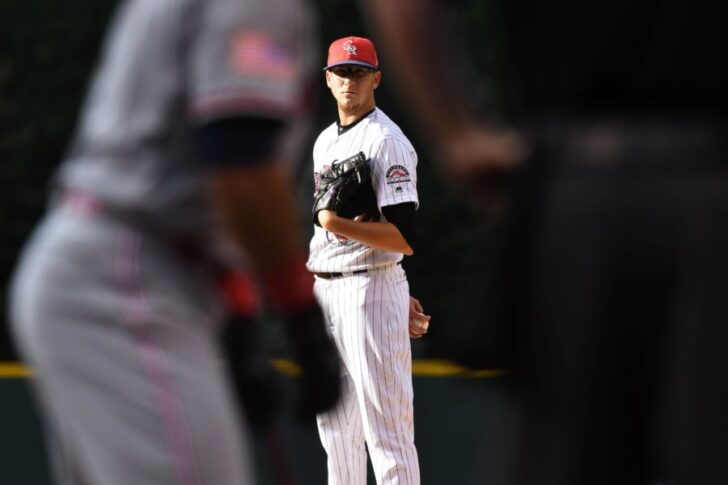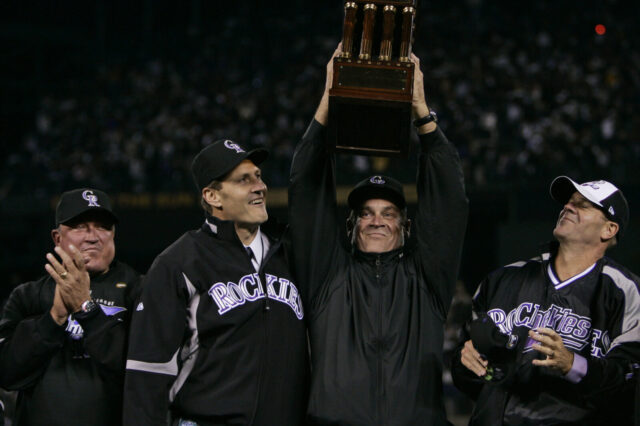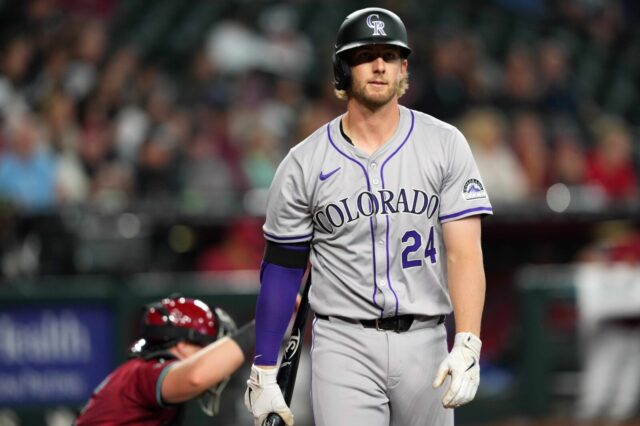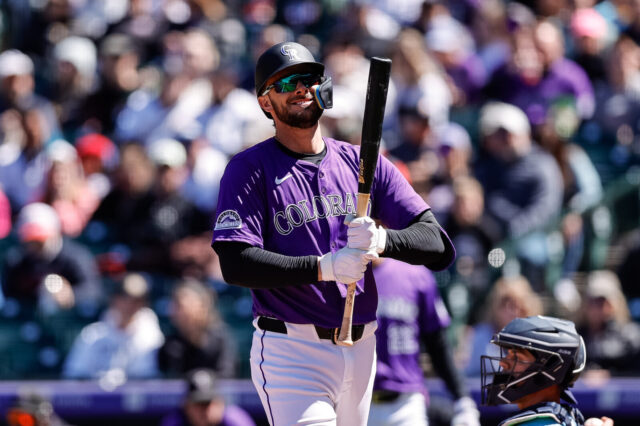When Colorado Rockies pitcher Jeff Hoffman got the call up in September last year, he struggled to make ends meet on the mound. Now, with a nearly a half year in the majors under his belt, Hoffman’s found his groove, and it’s been pretty phenomenal.
Finishing 0-4 last year with a 4.88 ERA in 31.1 innings last year, Hoffman’s made a 180 in his success so far in the bigs this year with a 5-1 record across 49.1 innings and a 4.03 ERA. In Monday night’s win against the Cincinnati Reds at Coors Field, he helped bolster those numbers with three earned runs, three walks and four strikeouts with 53 strikes thrown across 90 pitches and seven innings.
This past offseason, the Rockies’ pitching coaches, Darren Holmes and Steve Foster, have helped him work out all the kinks from last year.
“I just think I’m more comfortable in my delivery,” Hoffman said. “There’s not a huge change from what I did last year to what I do this year from a delivery standpoint.
“I’m just more comfortable and with all the work that me and [Foster] and [Holmes] put in over the offseason, I just think my body’s in a better place when push comes to shove, when I’m out front with the ball and my hands in the right spot now. Before, it was kind of sporadic, I was kind of all over the place, and now it’s consistent and everything’s coming out on the right planes.”
Back at the beginning of Spring Training, manager Bud Black said Hoffman’s skills were a bit shaky.
“I think from what I saw initially in spring training and what we talked about as camp broke, he wasn’t ready yet to be what we felt was a complete major league pitcher,” Black said. “There were still some stuff that Jeff needed to do to get to the point where we felt comfortable with him in all phases where a starting major league pitcher has to do. To his credit, he took those points and worked on them in Triple-A and took a lot of the things that Steve and Darren were giving to him, and put it into play, which is fantastic.”
Since making those adjustments, the coaching staff has been pleased with the strides Hoffman has made in such a short time.
“He pitched well in Triple-A for the most part, and when we needed him those first couple starts that he came up, he was very impressive,” Black said. “We sent him back and he kept a great frame of mind, kept a great attitude, and continued to work on some things, then he returned and has been in our rotation since. I think, really, the only poor game was the game against the Diamondbacks in his last start here, so he’s been pretty solid.”
“There’s still some things. He’s a young pitcher; he’s going to continue to learn and grow, and he’s going to have to make some adjustments, because he’s not going to sneak up on the league because he’s been making major league starts against major league teams, but you can’t deny the arm, can’t deny the stuff. He’s got a great start on the delivery, great strides on the mental stuff, so right now for where he is as a young pitcher, he’s at a pretty good place.”
However, the biggest difference between the two seasons, Hoffman believes, lies in his demeanor on the mound each time he steps on it.
“I feel like I’ve done a little bit better of a job keeping my emotions in check, not letting the game speed out of control,” Hoffman said. “Last year, I was a totally different pitcher, I think. This year, I’m more in the zone and more in command of everything: my body, my emotions, my pitches.”
His approach this year is much simpler, too.
“I’m just not trying to do too much with it,” Hoffman said. “When I get into doing too much, it just doesn’t work out for me. I think the mindset that I need to have is that my good is good enough to get me where I want to go and not do anything spectacular or try to go out there and throw seven innings, no hits or whatever. I just go out and just keep pitching pitch-by-pitch, and hopefully that gets me where I want to be.
“It’s just repetitions, at this level also. Obviously in Triple-A and Double-A, all those lower levels, you’re not playing in front of 40,000 people, so it’s an emotions kind of thing. You got to be able to keep your emotions in check and be able to keep calm and just get back to basics.”
Earlier in the season, the Rockies used Hoffman as a one-stop pitcher, as they would call him up for one game at a time and then promptly sent him back down to Triple-A with the Albuquerque Isotopes. Although he noticed key differences between play at the two levels, the experience he got down in the minors helped shape the pitcher he is today when he takes the mound for the Rockies.
“In Triple-A, you’re kind of still facing prospects every night and guys that really haven’t been in the bigs for a sustained amount of time or an extended amount of time, but up here, you’ve got guys with five to fifteen years of experience–I’m talking about guys like Chase Utley, and stuff like that,” Hoffman said. “It’s an experience thing, and you have to get used to it quick and you have to get results quick.”
At the same time, while he was bouncing around from the minors to the majors this season, some of the guys he pitched with down in the majors have been excelling at this level, like German Marquez, Kyle Freeland and Antonio Senzatela. That, he said, gives him the added peace of mind every time he sees action.
“I think it’s huge,” Hoffman said. “What I think is bigger is seeing what these other, younger guys are doing, because that kind of gave me confidence coming up the first few times around seeing that I’ve pitched side-by-side with these guys before and had success together, so why can’t we be successful together at this level too? So that’s a huge, huge shout out and a huge thanks to those guys for doing what they do and kind of giving me that peace of mind to know that I can do this too.”
Addtionally, the impact of having a former pitcher in Black has been immeasurable not only to Hoffman, but the entirety of the youthful starting rotation.
“I think it’s huge, having a guy like Buddy that has had so much experience at this level and has pitched so many games at the big league level, so he has kind of immediate feedback for you, whether it’s between innings…talking about an effort standpoint or an intensity standpoint,” Hoffman said. “I think with a staff as young as we are, that’s a necessity to have.”



